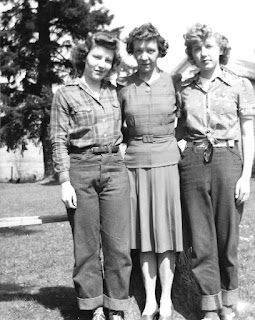I started writing this post in March of 2020 and then COVID happened and all of our lives changed. I'm just getting back to it this year in time to celebrate Aunt Helen's 95th birthday.
This is the first year in a long while that I will not be sending birthday greetings to Aunt Helen. She is in your company this year, not ours. It is very strange as she has always been an important part of my life. I was named for her and Cecil, so I became Cecily Louise. Like most of our stories, her story is complicated.
Cecil Oscar and Ada Grace (Colby) Werst in Spokane, Washington circa August 8, 1924.
It wasn't a very auspicious beginning for Helen. Her father, Cecil Oscar Werst, had died from an infected tooth 4.5 months before her birth. It was before penicillin, and he was gone in 10 days, leaving behind a stunned, pregnant wife, Grace (Colby) Werst and their 15 months old daughter, Betty Lorraine.
At age 27, death was probably the last thing on Cecil's mind. Times were good. The family was living in a comfortable rented house on McClellan Street in Spokane, Washington. Cecil had been promoted to manager at the Royal Silk Hosiery Company. Grace had worked as the secretary to the publisher of the Spokesman Review Newspaper and left her position to welcome their first child. We're not certain if Cecil or Grace already knew there was another baby on the way. He left no life insurance, some savings but most of that was invested in stocks.
Feeling desperate, Grace and Betty traveled by train to Pendleton, Oregon so she could be with her sister Madge (Colby) Massey during her confinement. Helen Louise Werst was born 10 Mar 1928 in Pendleton, Oregon.
Betty, Grace and Helen from left to right in Spokane circa 1928
Grace tried, really tried, to make it with her two girls back in Spokane. She was a modern woman and wanted to stand on her own two feet. Unfortunately, it was difficult to find a job, childcare, etc.
Complicating things even more was the economic situation in the country. Beginning in March 1929, the Federal Reserve began warning of the dangers of stock speculation and by October 29th everything crashed. The stocks that Grace held became worthless. She wrote to the company heads of each of the stocks she held pleading for a job.
Grace had to give up the rented home, sell many of their belongings and move in with Madge and her husband Harley Massey in Pendleton. Finally, a letter came with the offer of a job as a stenographer at the Smith Tower in Seattle. How could she get there? find a place to live? and most importantly, what about her daughters? I'm certain that she agonized about these decisions. In the end, Betty stayed with Aunt Madge and Uncle Hal in Pendleton and Helen went with her Mom to Seattle.
They probably traveled by train and found a boarding house recommended by co-workers or family friends. She arranged for Helen to stay with an older couple during the day and went to work. This arrangement lasted until the summer of 1932. Grace's father William Wallace Colby wrote asking her to come home and take care of him after his second wife passed.
Helen and Grace in Seattle circa 1930
Grace jumped at the chance to finally be able to raise her girls together at Pine Lawn Farm where she had spent her older childhood years. From the recounted stories, it was quite a change for everyone. Grace had been head of her family, making her own money and deciding how it would be spent. The much youngest of five girls, Grampa Colby was 45 when she was born, now he was 75 and set in his ways. He thought children should be seen but not heard and he was not shy about expressing his opinions on how Grace should be raising her daughters.
Betty and Grampa Colby (William Wallace Colby 1857-1936) at Pine Lawn Farm
It must have been difficult for the girls also! Betty had been left behind with her Aunt and only saw her mother the few times when she was sent on the bus from Pendleton to Seattle with a family friend who drove the bus. She missed her father and was away from her mother at the same time. Helen didn't get to see her mother during the day and was not fond of the couple who cared for her. She was jealous that Betty had nicer clothes that Aunt Madge had purchased. What a challenge for them all.
Turned out that Pine Lawn Farm was a wonderful place to spend one's childhood. There were animals, chores and kids the same age across the street. There was not much money, but it was the depression and few people had money. They could trade the chickens and prunes they raised for other crops and services they needed. The "farm" gave them a sense of belonging to a place that I've never had in my nomadic life. Maybe that's why we're keeping it in the family.
Above barn at Pine Lawn Farm, below farmhouse
Helen at farm circa 1945
Betty, Grace and Helen at the farm circa 1945
There is much more to add to her story but this is a good place to stop with chapter one.
Happy 95th birthday Aunt Helen! We miss you!
Love,
Cecily
.jpg)


.jpg)
.jpg)





No comments:
Post a Comment